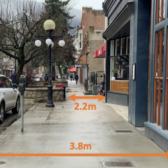ICBC releases top fraud claims of 2014
An exaggerated injury claim refuted by a travel blog; a hit-and-run victim turned perpetrator; and a false identity detected with facial recognition technology — these are just three of the most interesting cases from ICBC’s fraud files last year.
In 2014, ICBC’s two special investigation units advanced 131 charges to Crown counsel against 100 defendants, maintaining our average conviction rate of approximately 90 per cent per year.
While it’s difficult to accurately calculate the extent of fraudulent activities, ICBC estimates 10 to 15 per cent of insurance claims contain an element of fraud or exaggeration, consistent with industry estimates.
Preventing and investigating fraud is one way ICBC keeps claims costs down.
The vast majority of customers are honest but here are some recent cases of customers who weren’t so truthful:
The coverage conspiracy
A customer with only basic insurance and an expired driver’s licence rear-ended another vehicle. The customer asked the driver in the other vehicle to tell ICBC the crash happened a day later so she could buy optional insurance, which would cover the damage to her vehicle. The other driver refused. The underinsured customer then bought optional insurance on her way home from the crash, despite telling ICBC she went straight home after the crash when reporting the claim. Using the other driver’s statement to ICBC and time-stamped insurance transaction data, ICBC denied her claim. The underinsured driver was on the hook for the cost to repair both vehicles, which was more than $7,400.
The telltale airbag
A customer who was prohibited from driving claimed his vehicle had been stolen at the time it was involved in a three-vehicle crash. Forensic testing of residue on the vehicle’s driver-side airbag revealed a DNA match to the customer and proved he was in fact the driver at the time of the crash. The customer was found guilty of providing a false statement relating to an ICBC claim under the Insurance Vehicle Act, fined $1,000 and ordered to pay ICBC back more than $18,000 in claims costs and total loss payments paid out for the other two vehicles involved in the crash.
The torched lemon
A customer reported his truck was stolen at a movie theatre. The vehicle was recovered, burnt. A vehicle inspection showed the burnt truck had serious mechanical problems, contrary to what the customer told ICBC. Further investigation into the customer’s cellphone records revealed that he was at the scene where the burnt vehicle was found. The customer pled guilty to providing a false statement relating to an ICBC claim under the Insurance Vehicle Act, fined $4,000 and ordered to pay ICBC back more than $3,000 for investigative and claims costs.
The hit-and-run victim
A customer told ICBC his Honda Civic was parked outside his home when it was struck by an unknown vehicle that fled the scene. Damage to the customer’s vehicle was not consistent with a hit-and-run and paint flecks matching the customer’s Honda Civic were actually found embedded in a vehicle from another hit-and-run claim. When confronted with these pieces of evidence, the driver of the Honda Civic admitted to making a false claim, as he had in fact fled the crash scene after his vehicle struck another. The customer was found guilty of providing a false statement relating to an ICBC claim under the Insurance Vehicle Act, fined $1,000 and ordered to pay ICBC back more than $5,600 in claims costs and repair costs to the vehicles.
The traveller’s tale
A woman was a passenger in a vehicle that was rear-ended and told ICBC she had a long-term injury from the crash, including ongoing neck pain and headaches. ICBC’s special investigation unit found a blog by the injured passenger chronicling a six-month motorcycle trip through South America that included drives on extremely rough terrain, showing her injuries weren’t as severe as she claimed. This claim went to trial and the customer was awarded just $12,000 by the judge—two-thirds less than she’d originally asked for.
The ill-thought impersonation
A Vancouver police officer observed a driver talking on his cellphone while driving and pulled him over to discover the driver had received a 90-day driving prohibition two days earlier. The driver was charged with driving while prohibited, ticketed for driving while using a cellphone and received a one-year driving prohibition. Undeterred, the customer next obtained an interim driver’s licence using a friend’s identity and transferred his vehicle into his friend’s name. Using facial recognition software, ICBC identified the prohibited driver as impersonating his friend. The driver pled guilty to impersonation, a Criminal Code offence, and was ordered to pay a $2,500 fine and a $375 victim surcharge fee.


























